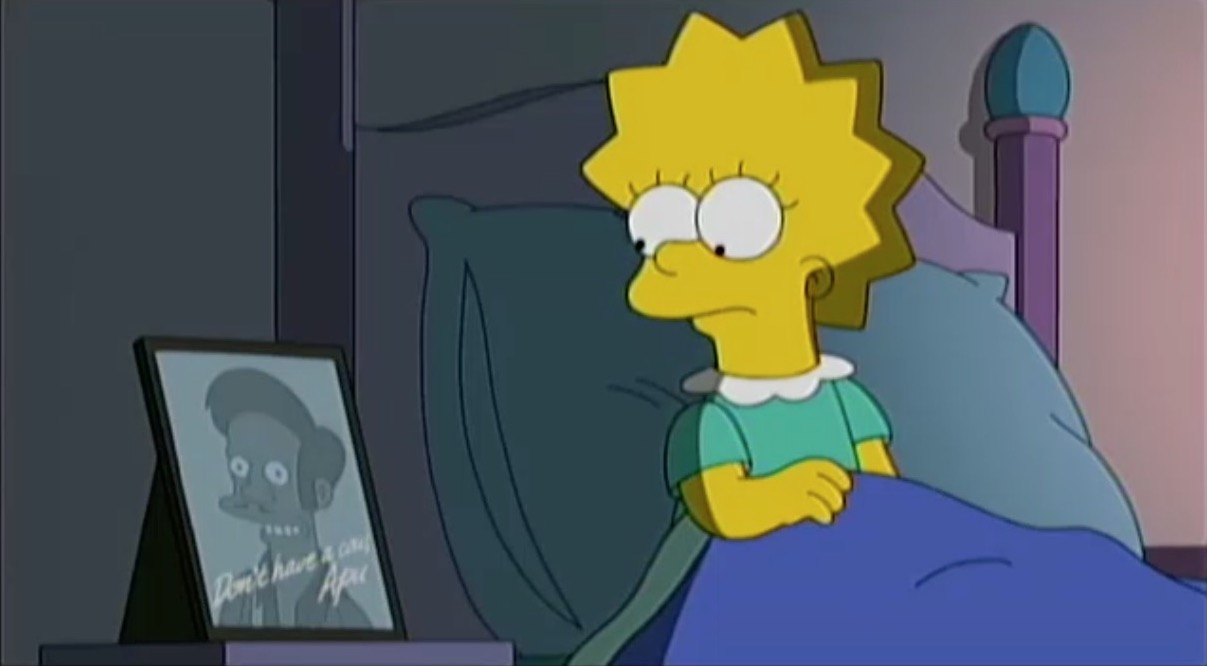The Simpsons Tried to Address the Apu Controversy And, Uh, It Wasn’t Good

The Simpsons’ character Apu Nahasapeemapetilon, voiced by Hank Azaria, has always been an uncomfortable and stereotypical character from his first introduction in 1990. The conversation around Apu, however, was recently reignited by comedian Hari Kondabolu’s The Problem With Apu which brought together several Indian and Indian-American actors to talk about the impact of Apu and the need for better representation in film and television.
A key part of Kondabolu’s short documentary was his desire to try and interview Azaria, with the ultimate hope that he’d stop doing the accent. However, we see Azaria continuously decline interviews and in a separate interview, writer/producer Dana Gould defends the character. As a result, the show didn’t come out looking particularly flattering in the show’s decision to stand by the offensive character. After the documentary came out, however, The Simpsons said that they would address the issue. I guess better 28 years late, than never?
The show briefly touched on the Apu problem in the episode titled “No Good Read Goes Unpunished”, which has Marge reading an “updated” and “politically correct” version of The Princess in the Garden. The event is seen as sucking all the soul out of a story, and ruining it. It went down like this:
“It takes a lot of work to take the spirit and character out of a book,” says Marge, “but now it’s as inoffensive as a Sunday in Cincinnati.”
After a few lines of this new book, Lisa responds, “But since she’s already evolved, she doesn’t really have an emotional journey to complete”, and continues, “kinda means there’s no point to the book.”
“What am I supposed to do?” asks Marge.
“It’s hard to say,” replies Lisa, who turns to look at the viewer. “Something that started decades ago and was applauded and inoffensive, is now politically incorrect. [at this point, Lisa turns to a photo of Apu that says “Don’t have a cow.”] What can you do?”
“Some things will be dealt with at a later date,” adds Marge.
“If at all,” replies Lisa. The two then look at the viewer.
Whether this means that the show will deal with Apu “at a later date”, the implications of this are crystal clear. The exchange suggests that Apu was only offensive recently (it was always offensive), political correctness ruins stories (no, stereotyping and further marginalizing already marginalized people ruins stories), and that the people angry are implying that all characters should be perfect (flawed and inherently offensive are very different characterizations).
Kondabolu responded to the episode on Twitter, writing:
Wow. “Politically Incorrect?” That’s the takeaway from my movie & the discussion it sparked? Man, I really loved this show. This is sad. https://t.co/lYFH5LguEJ
— Hari Kondabolu (@harikondabolu) April 9, 2018
Clever…because he’s Hindu. They double-downed on white. https://t.co/F6hvudObxh
— Hari Kondabolu (@harikondabolu) April 9, 2018
In “The Problem with Apu,” I used Apu & The Simpsons as an entry point into a larger conversation about the representation of marginalized groups & why this is important. The Simpsons response tonight is not a jab at me, but at what many of us consider progress.
— Hari Kondabolu (@harikondabolu) April 9, 2018
Kamau Bell, who appear in The Problem With Apu also weighed in, here are some highlights from his thread (which you can click to read in full):
I think the fact that they put this “argument” in the mouth of Lisa’s character, the character who usually champions the underdogs and is supposed to be the most thoughtful and liberal, is what makes this the most ridiculous (as in worthy of ridicule) and toothless response.
— Wakanda Kamau Bell (@wkamaubell) April 9, 2018
My friend @harikondabolu made a beautiful & powerful film. It took guts to do it. He knew he was going after a sacred cow. (Pun intended.) He knew many people would just watch the trailer or see the poster or just hear the title & immediately just hate on it & him.
— Wakanda Kamau Bell (@wkamaubell) April 9, 2018
The “argument” the episode makes is basically things used to better before political correctness when nobody cared about all these groups. It ignores the facts that ALL THESE GROUPS ALWAYS CARED ABOUT ALL THESE GROUPS. But these groups’ complaints weren’t respected/supported.
— Wakanda Kamau Bell (@wkamaubell) April 9, 2018
The entire anti-political correctness argument is…
“I don’t get why you’re complaining that your toe was stepped on when I never felt my toe being stepped on… What does me wearing steel toed boots & you not having shoes have to do w/ anything?” – Steel toe boot factory owner
— Wakanda Kamau Bell (@wkamaubell) April 9, 2018
It’s disappointing that it seems like the writers missed the entire point of The Problem with Apu, which was a thoughtful film coming from a Simpsons fan. There was so much more to this discussion than simply “political correctness” and it’s frustrating that their late response to that project is to just sort of shrug.
The answer to “What can you do?”, in addition to “stop”, is probably, “Don’t make a dismissive and misunderstood response to people who care about the representation of marginalized groups.”
(via The Hollywood Reporter, image: screencap)
Want more stories like this? Become a subscriber and support the site!
—The Mary Sue has a strict comment policy that forbids, but is not limited to, personal insults toward anyone, hate speech, and trolling.—
Have a tip we should know? [email protected]